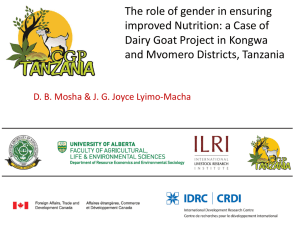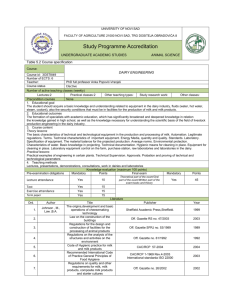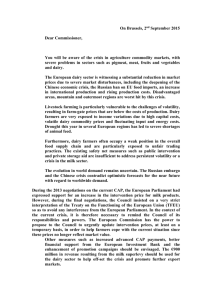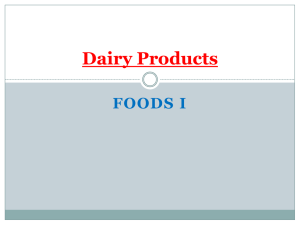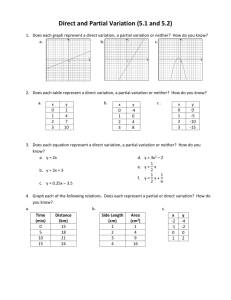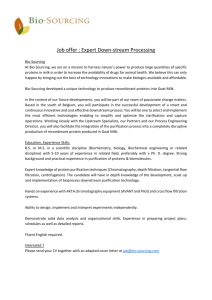Monday 23 rd Tuesday 24th Wednesday 25th
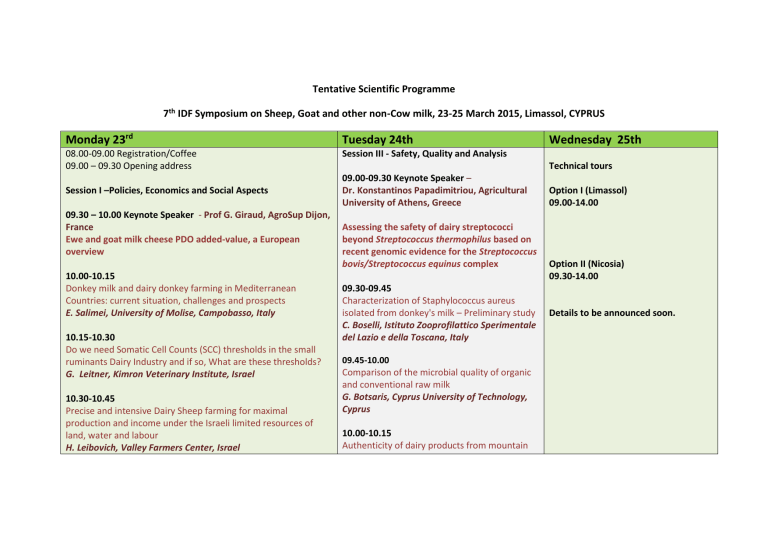
Tentative Scientific Programme
7
th
IDF Symposium on Sheep, Goat and other non-Cow milk, 23-25 March 2015, Limassol, CYPRUS
Monday 23
rd
08.00-09.00 Registration/Coffee
09.00 – 09.30 Opening address
Session I –Policies, Economics and Social Aspects
09.30 – 10.00 Keynote Speaker - Prof G. Giraud, AgroSup Dijon,
France
Ewe and goat milk cheese PDO added-value, a European overview
10.00-10.15
Donkey milk and dairy donkey farming in Mediterranean
Countries: current situation, challenges and prospects
E. Salimei, University of Molise, Campobasso, Italy
10.15-10.30
Do we need Somatic Cell Counts (SCC) thresholds in the small ruminants Dairy Industry and if so, What are these thresholds?
G. Leitner, Kimron Veterinary Institute, Israel
10.30-10.45
Precise and intensive Dairy Sheep farming for maximal production and income under the Israeli limited resources of land, water and labour
H. Leibovich, Valley Farmers Center, Israel
Tuesday 24th
Session III - Safety, Quality and Analysis
09.00-09.30 Keynote Speaker –
Dr. Konstantinos Papadimitriou, Agricultural
University of Athens, Greece
Assessing the safety of dairy streptococci beyond Streptococcus thermophilus based on recent genomic evidence for the Streptococcus
bovis/Streptococcus equinus complex
09.30-09.45
Characterization of Staphylococcus aureus isolated from donkey's milk – Preliminary study
C. Boselli, Istituto Zooprofilattico Sperimentale del Lazio e della Toscana, Italy
09.45-10.00
Comparison of the microbial quality of organic and conventional raw milk
G. Botsaris, Cyprus University of Technology,
Cyprus
10.00-10.15
Authenticity of dairy products from mountain
Wednesday 25th
Technical tours
Option I (Limassol)
09.00-14.00
Option II (Nicosia)
09.30-14.00
Details to be announced soon.
10.45-11.00
The Cyprus sheep and goat sector: Results from the DoMEsTIc project on economics, policies and social aspects
G. Hadjipavlou Agricultural Research Institute, Cyprus
11.00-11.15 - Q/A
11.15-11.45 – Coffee and poster viewing
11.45-12.00
The Sheepherders' School as Innovative Initiative to potentiate the Ovine Sector: the example of the Basque Country
E. Ugarte, Neiker Tecnalia, Spain
12.00-12.15
Sheep and Goat milk quality in Cyprus: the official control’s perspective
K. Lemoniati, Veterinary Services, Cyprus
12.15-12.30
Greenhouse gas emissions of Italian sheep
A. S. Atzori, University of Sassari, Italy
12.30-12.45 The Evaluation and Production of Sheep and Goat's
Milk in Turkey
G. Dellal, FIL-IDF Turkish National Committee/ National Dairy
Council of Turkey, Turkey
12.45-13.00 – QA / Closing of Session I
13.00-14.00 – Lunch and poster viewing grazing sheep
L. J. R. Barron University of the Basque
Country, Spain
10.15-10.30
Application of Capillary electrophoresis to the characterisation of major camel milk proteins
A. Omar, University of Reading, UK
10.30-10.45 Q/A
10.45-11.15 Coffee and poster viewing
Session IV - Novel Products and Emerging
Processing Technologies
11.15-11.45 Keynote Speaker –
Dr. T. Huppertz , NIZO Food Research,
Netherlands
Novel technologies for the dairy industry: applicability to non-bovine milk
11.45-12.15 Keynote Speaker -
Dr. B. Malmgren - Tetra Pak, Sweden
Challenges in processing of goat, buffalo and camel milk for longer shelf life
12.15-12.30
Improving the heat stability of goat milk
M. Lewis, University of Reading, UK
Session II – Product Characteristics and Potential Health Impact
14.00-14.30 – Keynote Speaker –
Dr. A. Clemente, Estacion Experimental del Zaidin (CSIC), Spain
Goat’s milk and their health-promoting benefits: an overview
14.30-14.45
The fatty acid profile and organoleptic characteristics of Halloumi cheese produced from ewe’s milk fed with ensiled olive cake
O. Tzamaloukas, Cyprus University of Technology, Cyprus
14.45-15.00
Lactic Acid Bacteria isolated from raw donkey milk: biodiversity, technological characteristics and probiotic potential
M. Aspri, Cyprus University of Technology, Cyprus
15.00-15.15
Differences in the biodiversity of lactic acid bacteria between an industrial-type and artisan-type Greek PDO Galotyri cheese
J. Samelis, Hellenic Agricultural Organization DEMETER, Greece
15.15-15.30
Goat milk fatty acids: consequences of a transition from dry to grass based diet according to the αs1 casein phenotype, the
IPHIGENIE project
I.Guillet, ACTALIA, France
15.30-16.00 Q/A
16.00 – 16.30 – Coffee and poster viewing
12.30-12.45
Camel milk cheese
M. Hofi, Ain Shams University, Egypt
12.45-13.00 QA / Closing of Session IV
13.00-14.00 Lunch and Poster viewing
Session V - Milk Production Strategies
14.00-14.30 Keynote Speaker -
Prof A. Cannas, University of Sassari, Italy
14.30-14.45
Interactions between the animal, the milking machine and the milker: contributions of milking time tests in small ruminants
16.30-16.45
Biodiversity of bacterial and fungal microbiota in Turkish Divle
Cave cheese
Ş.Ö. Budak, CBS-KNAW Fungal Biodiversity Centre, Netherlands
16.45-17.00
Changes in the composition of total fatty acids, tocopherols and retinoids, and cholesterol concentration in milk from rapeseed oilcake feeding sheeps
M.A Bustamante, University of the Basque Country, Spain
17.00-17.15
Ripening of white cheese in large-capacity brine tanks
L. Sakkas, Agricultural University of Athens, Greece
17:15-17:30
Microbiota dynamics and lactic acid bacteria biodiversity in raw goat milk cheeses
A.Picon, INIA-Department of Food Technology, Madrid, Spain
17.30–18.00 - QA / Closing of Session I
19.00-20.00 Welcome Reception
J.L. Poulet, French Livestock Institute, France
14.45-15.00
On-farm welfare assessment protocol for adult female dairy goats in intensive husbandry systems
G. Stilwell, University of Lisbon, Portugal
15.00-15.15
Milk production and quality of dairy goat production systems in Greece
G. Arsenos, Aristotle University, Thessaloniki,
Greece
15.15-15.30
Including Tomato Wastes and Olive Oil Byproducts in the Diet of Dairy Goats Increases milk production and Modifies its Fatty Acid Profile
A. Arco, Estación Experimental del Zaidín (CSIC),
Spain
15.30-15.45
Dietary and breed effects on goat milk attributes
Nurit Argov-Argaman, Hebrew University,
Israel
15.45-16.00 Q/A
16.00-16.15 Coffee and poster viewing
DAMASCUS GOAT MEETING
16.15-16.30
Feeding and Management of Damascus Goats
M. Hadjipanayiotou, Agricultural Research
Institute , Cyprus
16.30-16.45
Cross breeding grazing Baladi and Damascus with Alpine goats: from conception to the end of first lactation
S.Y. Landau, ARO, Israel
16.45-17.00
Analysis and Definition of the Genetic
Improvement Objectives and Programs in the
Damascus Goat in Cyprus
A.P. Mavrogenis, Agricultural Research Institute ,
Cyprus
17.00-17.15
Alternative to anthelmintic chemical drugs in dairy goats: a lesson from Mediterranean Arab ethno-veterinary tradition
H. Muklada, ARO, Israel
17.15-17.30
Damascus and Baladi goats’ behaviors differ in tannin-rich Mediterranean shrubland and woodland.
T. Glasser, Ramat Hanadiv , Israel
The Scientific Programme is subject to minor changes.
17.30-18.30 Q/A Closing of the
Conference/Conclusions
19.30-22.30 Conference Dinner

